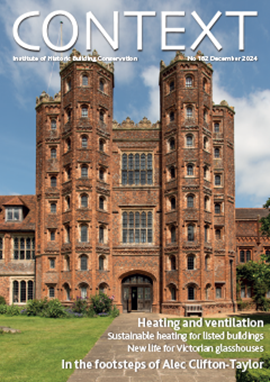Local Authority Conservation Staffing Resources in England 2020
In October 2020, The Institute of Historic Building Conservation (IHBC) published the results of its 2020 research into specialist conservation provision in Local Authorities (LAs) in England, revealing a 48.7% fall since 2009 and 6% currently with no access to advice. This research will inform the Briefing Note on the England’s Planning White Paper from the new ‘Conservation Places and People’ All-Party Parliamentary Group (CPP APPG) on 4 November.
IHBC Chair David McDonald said: “This survey demonstrates just how much local authority conservation services in England have been reduced over the last decade. Access to specialist advice decreasing by almost 50% since 2009 is a statistic that speaks for itself. If we add to that the loss of senior staff and the consequent wealth of knowledge and experience that is no longer available the overall picture is even worse. Of similar concern are those authorities that do not have access to any conservation advice. Not only are they failing in providing an adequate service, but also there must be an increased risk of Ombudsman complaints or Judicial Reviews.”
Fiona Newton, IHBC’s lead on this work since 2006 said: “Conservation advice is the critical frontline for protecting the historic environment and once lost it can never be recovered. With 6% of Local Authorities now having no access to conservation advice and many others having just part time access to advice this lack of advice exposes the nation’s heritage to the real risk of harm.”
IHBC Director Seán O’Reilly said: “The loss of 48.7% of conservation provision across England since 2009 can only have had a devastating effect on local authorities and some may be no longer even able to carry out even their statutory conservation duties. The reduced levels of conservation staffing in most Local Authorities mean that Listed Building owners and developers are often no longer able to get detailed proactive and practical support and advice from the Local Authority to help them to maintain and protect the heritage for which they are responsible.”
The significant findings of the research are:
- 6% of Local Authorities do not have access to conservation advice in any form
- 50% of all Local Authorities have a service of any type which is below 0.5 Full Time Equivalent and may not be providing a credible service
- Since 2018 the conservation specialist advice available to Local Authorities in England has decreased by 0.78%
- Since 2006 the conservation specialist advice available to Local Authorities in England has decreased by 35.22%
- Since 2009 the conservation specialist advice available to Local Authorities in England has decreased by 48.7%
These conclusions form just a part of IHBC’s ongoing examination of conservation staffing in the UK. From 2006 IHBC has produced figures with outside funding support; regularly for England and one-off examinations of Wales and Scotland.
The data collected during the 2020 lockdown and funded exclusively by IHBC was compared with Local Authority capacity from 2006, 2009 and 2018. A consistent methodology has been used since 2006.
This article was originally published on the IHBC NewsBlog on 30 October 2020.
--Institute of Historic Building Conservation
[edit] Related articles on Designing Buildings Wiki
- Charging for Listed Building Consent pre-application advice.
- CIAT shares IHBC research into LA conservation service capacity.
- Conservation area.
- Conservation of the historic environment.
- Conservation officer.
- Conservation practice survey 2016.
- IHBC articles.
- Impact of heritage sector local authority funding cuts in south west England.
- Local authority conservation specialists jobs market 2014.
- Loss of senior conservation staff and posts in England March 2010 to April 2011.
- Planning authority duty to provide specialist conservation advice.
- The Institute of Historic Building Conservation.
IHBC NewsBlog
SAVE celebrates 50 years of campaigning 1975-2025
SAVE Britain’s Heritage has announced events across the country to celebrate bringing new life to remarkable buildings.
IHBC Annual School 2025 - Shrewsbury 12-14 June
Themed Heritage in Context – Value: Plan: Change, join in-person or online.
200th Anniversary Celebration of the Modern Railway Planned
The Stockton & Darlington Railway opened on September 27, 1825.
Competence Framework Launched for Sustainability in the Built Environment
The Construction Industry Council (CIC) and the Edge have jointly published the framework.
Historic England Launches Wellbeing Strategy for Heritage
Whether through visiting, volunteering, learning or creative practice, engaging with heritage can strengthen confidence, resilience, hope and social connections.
National Trust for Canada’s Review of 2024
Great Saves & Worst Losses Highlighted
IHBC's SelfStarter Website Undergoes Refresh
New updates and resources for emerging conservation professionals.
‘Behind the Scenes’ podcast on St. Pauls Cathedral Published
Experience the inside track on one of the world’s best known places of worship and visitor attractions.
National Audit Office (NAO) says Government building maintenance backlog is at least £49 billion
The public spending watchdog will need to consider the best way to manage its assets to bring property condition to a satisfactory level.
IHBC Publishes C182 focused on Heating and Ventilation
The latest issue of Context explores sustainable heating for listed buildings and more.

















